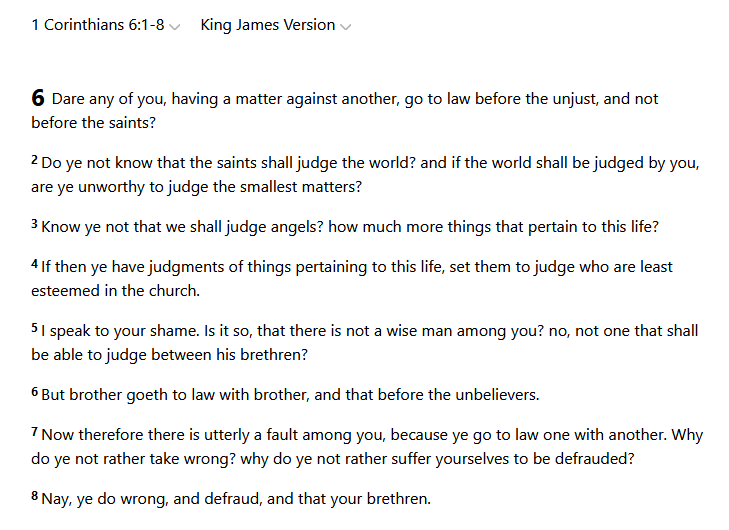The Supreme Court held in Grannis v. Ordean (1914) 234 US 385 at 395, that “even in names, due process of law does not require ideal accuracy. In the spelling and pronunciation of proper names there are no generally accepted standards, and the well-established doctrine of idem sonans…is recognition of this.” In that case, a person with the unusual name of Albert Gilfuss ignored the delivery of a summons and court pleadings against “Albert Gilfuss” (presumably typed in all-caps) and the default judgment against him was binding. A similar ruling on a misspelling on an indictment in Faust v. US (1896) 163 US 452.
[Idem Sonans is when a name sounds the same, but spelled differently. And thus why, if you answer to a name that sounds the same as yours, yet is spelled in all caps, you give the court jurisdiction. So don’t answer! Also, notice that Albert had these papers “delivered” to him, insinuating he had an address, which gave the court jurisdiction.]
In a Missouri arraignment in 1996, “one of the ‘freemen’ stood up to announce that…he refused to recognize anything but his ‘full Christian name’ (evidently not printed in all caps and with some punctuation). This resulted in an unusual scene. An arrest warrant was issued and executed for the defendant’s failure to appear at his arraignment even though he was physically present in the court room.” J.W. Nixon & E.R. Ardini, Combating Common Law Courts, Criminal Justice, spring 1998, p.14.
[This is why it is so important not to appear before their courts.
Take note of these:
Maxims of Law: The presence of the body cures the error in the name; the truth of the name cures an error in the description.
An error in the name is immaterial if the body is certain. An error in the name is nothing when there is certainty as to the person. The truth of the demonstration removes the error of the name.
A general appearance cures antecedent irregularity of process, a defective service, etc.Certain legal consequences are attached to the voluntary act of a person.]
In one instance, a federal judge, confronted with a tax protester whose argument consisted of the fact that all the tax and legal documents spelled his name out in capitals in a normal way while he insisted his name was spelled out with capitals and lower case letters and with punctuation in the middle (i.e. Edgar Francis., Bradley), ordered him to undergo psychiatric examination (which subsequently found him to be competent to stand trial). B.L. Kaufman, Judge Orders Defendant Tested, Cincinnati Enquirer, 6/17/98.
[Can you blame the judge? Here is a guy admitting the name on these documents is his name! Then turns around and says it’s not his name (because it’s not spelled that way). This guy is obviously confused (or deceived)]
So remember, if a court yells out a name that “sounds” like your name, and you know that the name called out is not your name (because the court has spelled it in all capital letters), then do not answer to that fictitious name!
State v. R.E. Wilson (Mont.Supm unpub 12/3/98). Appellant argued that his convictions, for driving without a license or insurance or registration, was invalid solely because the court papers identified him as “Richard E. Wilson,” whereas he claimed his actual name is “Richard Earl., of Wilson” (period after Earl and no capital for Wilson), consisting of his “nomen, pronomen and cognomentation” in that order. The court rejected this argument by ruling, “The caption more than adequately identifies [the] appellant as the party in interest…and appellant’s efforts to distinguish his name from that shown on the caption by means of punctuation and terminology are wholly unpersuasive.”
[The appellant basically argued that he can drive without a license solely because the court misspelled his name.
This is not true.
#1: The way a court spells a name is not an excuse for driving without a license. The reason for exercising your duty of movement on the common way is solely because Christ commanded us to do so without permission from men.
#2. The fact that he admitted to “driving” gave them jurisdiction because it’s a commercial term.
#3: He admitted to being, or did not refute the accusation that he was, an “appellant” and a “party” to the action, which gave the court jurisdiction.]
And approximately at the same time, The Cincinnati Enquirer (12/16/98) reported that an Ohio court rejected that a defendant who had taken to identifying himself as “Jack Edward; Taylor” was not the jack Edward Taylor” named in the court documents, especially since there were plenty of old letters and other papers he had signed in the usual way and sometimes without his middle name. The verdict was rebutted on use of semicolon.
[This defendant, by his own act, showed himself to be a false witness by signing his name on other pieces of paper the same way that he himself said it was not spelled. By signing his name to the “fictitious name” in all caps, he stood as surety in the flesh for the “person” the State created. He became “one flesh” and merged with a lie. The State used his own evidence against him. This is God’s rod of correction for having a double mind.]
US v. Weatherley (ED Penn 1998) 12 F.Supp.2d 469. Threatened to sue the court clerk and others if they didn’t address all their mail and paperwork to a very strange and long description of him with his name interrupted by a colon and his street address without a zip code.
[Followers of Christ are forbidden to sue others (1 Corinthians 6:1-8) and it is not the character of a bondman of Christ to use threats against others. The words we speak will be used to judge us as to whether we are truely of God, or of the world.]

US v. Klimek (ED Penn 1997) 952 F.Supp 1100. Tried to refuse all pleadings and court papers that spelled his name in all caps and without intervening punctuation.
Swartzendruber v. US (WD Mo unpub 4/17/97). Threatened to refuse any court papers that printed her name in the normal way or which were addressed in the normal way, didn’t help because her case was immediately dismissed.
In re Busby (MD Fla unpub 10/2/98) 82 AFTR2d 6924. Used colon in midst of name in pleadings, but case option had normal name.

